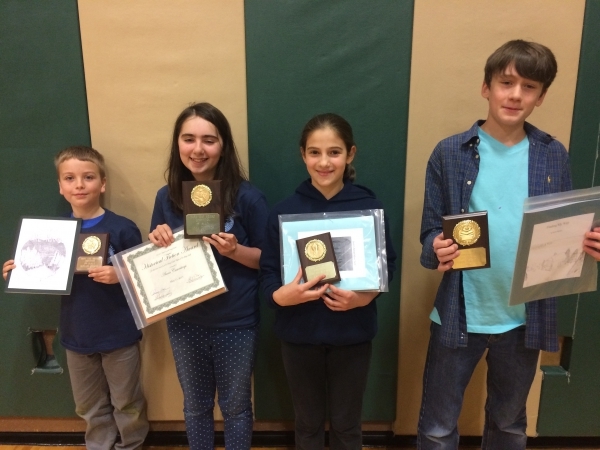BRATTLEBORO — Kids in the fifth and sixth grades get a lot of attention from the adults around them if they can handle a ball or a saxophone. But what if they can handle a pen?
That's what the Maple Leaf Writing Project is all about.
Maple Leaf is a rigorous writing contest open to all fifth- and sixth-graders at Oak Grove, Green Street, and Academy schools.
The program begins in October and ends with an awards ceremony in April. During that period, students polish their entries - a minimum of 2,000 words and a maximum of 3,000 - under the guidance of professional writers who act as mentors.
The students can write about whatever they like, but must meet strict deadlines. Unlike adult authors, they must also illustrate their work.
This year's award ceremony was held May 11. The first place winner was Anna Cummings, who won for her story, Let Us Hope Until There's No Hope Left. Second place was Swept Down the River by Papillon O'Feral.
A rare tie for third
There was a rare tie for third place this year, with Gone by Aleksa Secrest and Finding My Way by Simon Atkinson sharing the honor. Kali Taylor won Best Illustrator for Leah's Great Adventure.
“The ceremony was sweet and predictable in the way ceremonies marking the accomplishments of the young are,” said Dianne Clouet, who teaches at the Green Street School and serves as the director of the Maple Leaf program. “I saw plenty of high-fiving among proud participants as they each walked back to their seat with their recognition certificate. They got their Maple Leaf T-shirts, and the big celebratory cake, and got to take their books home.”
Maple Leaf is a voluntary program and not everyone who starts it finishes. Students, who usually choose to write fiction, must create a first draft, meet deadlines, and work with their mentors.
The mentors are Jessie Haas, who has written more than 35 young adult and children's books, and her husband, also a children's writer, Michael Daley. Both have been mentors since the program was started by now-retired teacher Flo Nestor 16 years ago.
“We continue to be impressed by the quality of work from some of these kids that seems so much above what we remember being capable of at that age,” Haas said. “Being a mentor is lot of work, but one of the things we really like is having a one-on-one with each child. Sometimes I get indignant about bad writing, but I sit down with the kid and they're so smart!
“And they may have very sophisticated thinking about their story. It may not be on the page, but it's interesting. And since Michael and I are children's writers who don't have kids, it's good to check in and see what kind of things are on kids' minds. Last year they killed off parents in great numbers. This year doesn't seem to have a theme.”
To critique - and be critiqued
Having your work critiqued is an integral - and difficult - part of the program.
“It's challenging,” Daley said. “When they get critiqued by writing groups in each school, they are getting feedback straight in the face. It's something that happens twice in the program. Generally, most of them sail right through.”
Participants are also schooled in listening and giving feedback.
“We try to teach [that] they all have to focus on the person who's reading,” Daley said. “It takes them out of the 'Only my work is interesting and important' mindset.
“In our lives as writers, we've learned tons by listening to other people's work and finding out what they do that's great, and what they do that's 'I wouldn't write it that way.' They also learn how to be a critiquer. Think of yourself in that position, we say, and how hurtful a negative comment can be.
“We encourage the students to lead with a positive aspect. And generally they all succeed in doing that.”
The goal of the program is to produce better writers, Clouet said.
“Some need to learn how to construct sentences,” she said. “Some are really working at a more advanced level. They can plan a story with a plot. But for me as their teacher, I want them to come out with a sense of being more accomplished writers. Writing is a really important art form. It's really important to be able to express yourself on the page. I'm a believer. And I really work hard to keep the Maple Leaf program moving.”
